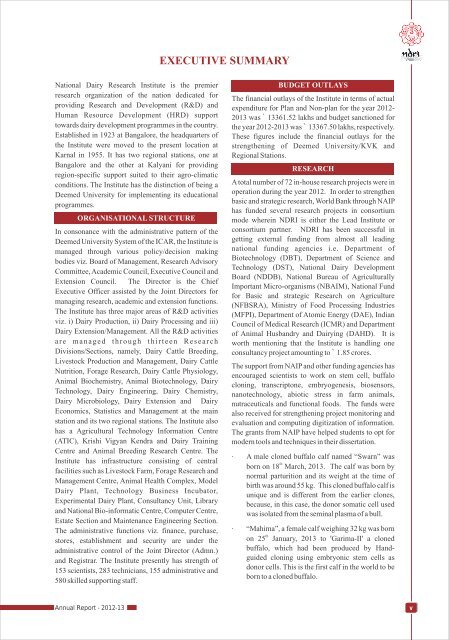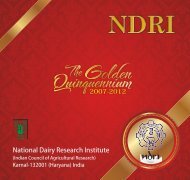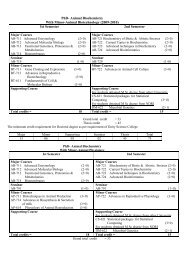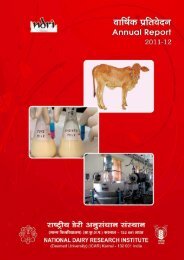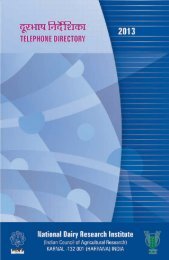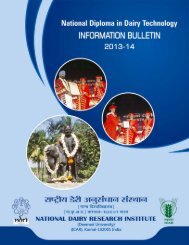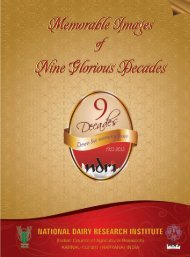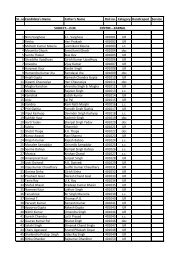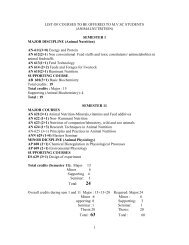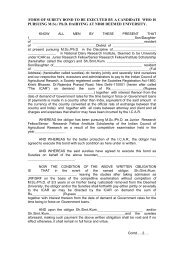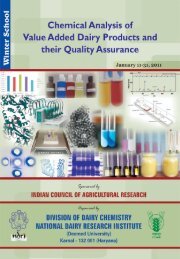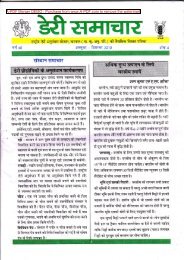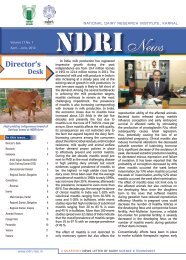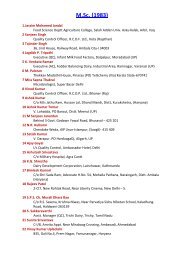executive summary - National Dairy Research Institute
executive summary - National Dairy Research Institute
executive summary - National Dairy Research Institute
You also want an ePaper? Increase the reach of your titles
YUMPU automatically turns print PDFs into web optimized ePapers that Google loves.
EXECUTIVE SUMMARY<br />
<strong>National</strong> <strong>Dairy</strong> <strong>Research</strong> <strong>Institute</strong> is the premier<br />
BUDGET OUTLAYS<br />
research organization of the nation dedicated for<br />
The financial outlays of the <strong>Institute</strong> in terms of actual<br />
providing <strong>Research</strong> and Development (R&D) and expenditure for Plan and Non-plan for the year 2012-<br />
Human Resource Development (HRD) support 2013 was ` 13361.52 lakhs and budget sanctioned for<br />
towards dairy development programmes in the country. the year 2012-2013 was ` 13367.50 lakhs, respectively.<br />
Established in 1923 at Bangalore, the headquarters of These figures include the financial outlays for the<br />
the <strong>Institute</strong> were moved to the present location at strengthening of Deemed University/KVK and<br />
Karnal in 1955. It has two regional stations, one at Regional Stations.<br />
Bangalore and the other at Kalyani for providing<br />
RESEARCH<br />
region-specific support suited to their agro-climatic<br />
conditions. The <strong>Institute</strong> has the distinction of being a A total number of 72 in-house research projects were in<br />
Deemed University for implementing its educational<br />
operation during the year 2012. In order to strengthen<br />
programmes.<br />
basic and strategic research, World Bank through NAIP<br />
has funded several research projects in consortium<br />
ORGANISATIONAL STRUCTURE mode wherein NDRI is either the Lead <strong>Institute</strong> or<br />
In consonance with the administrative pattern of the consortium partner. NDRI has been successful in<br />
Deemed University System of the ICAR, the <strong>Institute</strong> is getting external funding from almost all leading<br />
managed through various policy/decision making<br />
national funding agencies i.e. Department of<br />
bodies viz. Board of Management, <strong>Research</strong> Advisory<br />
Biotechnology (DBT), Department of Science and<br />
Technology (DST), <strong>National</strong> <strong>Dairy</strong> Development<br />
Committee, Academic Council, Executive Council and<br />
Board (NDDB), <strong>National</strong> Bureau of Agriculturally<br />
Extension Council. The Director is the Chief<br />
Important Micro-organisms (NBAIM), <strong>National</strong> Fund<br />
Executive Officer assisted by the Joint Directors for<br />
for Basic and strategic <strong>Research</strong> on Agriculture<br />
managing research, academic and extension functions.<br />
(NFBSRA), Ministry of Food Processing Industries<br />
The <strong>Institute</strong> has three major areas of R&D activities<br />
(MFPI), Department of Atomic Energy (DAE), Indian<br />
viz. i) <strong>Dairy</strong> Production, ii) <strong>Dairy</strong> Processing and iii) Council of Medical <strong>Research</strong> (ICMR) and Department<br />
<strong>Dairy</strong> Extension/Management. All the R&D activities of Animal Husbandry and <strong>Dairy</strong>ing (DAHD). It is<br />
are managed through thirteen <strong>Research</strong> worth mentioning that the <strong>Institute</strong> is handling one<br />
Divisions/Sections, namely, <strong>Dairy</strong> Cattle Breeding, consultancy project amounting to ` 1.85 crores.<br />
Livestock Production and Management, <strong>Dairy</strong> Cattle<br />
The support from NAIP and other funding agencies has<br />
Nutrition, Forage <strong>Research</strong>, <strong>Dairy</strong> Cattle Physiology,<br />
encouraged scientists to work on stem cell, buffalo<br />
Animal Biochemistry, Animal Biotechnology, <strong>Dairy</strong><br />
cloning, transcriptone, embryogenesis, biosensors,<br />
Technology, <strong>Dairy</strong> Engineering, <strong>Dairy</strong> Chemistry,<br />
nanotechnology, abiotic stress in farm animals,<br />
<strong>Dairy</strong> Microbiology, <strong>Dairy</strong> Extension and <strong>Dairy</strong> nutraceuticals and functional foods. The funds were<br />
Economics, Statistics and Management at the main also received for strengthening project monitoring and<br />
station and its two regional stations. The <strong>Institute</strong> also evaluation and computing digitization of information.<br />
has a Agricultural Technology Information Centre The grants from NAIP have helped students to opt for<br />
(ATIC), Krishi Vigyan Kendra and <strong>Dairy</strong> Training modern tools and techniques in their dissertation.<br />
Centre and Animal Breeding <strong>Research</strong> Centre. The<br />
• A male cloned buffalo calf named “Swarn” was<br />
<strong>Institute</strong> has infrastructure consisting of central<br />
th<br />
born on 18 March, 2013. The calf was born by<br />
facilities such as Livestock Farm, Forage <strong>Research</strong> and<br />
normal parturition and its weight at the time of<br />
Management Centre, Animal Health Complex, Model<br />
birth was around 55 kg. This cloned buffalo calf is<br />
<strong>Dairy</strong> Plant, Technology Business Incubator,<br />
unique and is different from the earlier clones,<br />
Experimental <strong>Dairy</strong> Plant, Consultancy Unit, Library<br />
because, in this case, the donor somatic cell used<br />
and <strong>National</strong> Bio-informatic Centre, Computer Centre,<br />
was isolated from the seminal plasma of a bull.<br />
Estate Section and Maintenance Engineering Section.<br />
The administrative functions viz. finance, purchase, • “Mahima”, a female calf weighing 32 kg was born<br />
th<br />
stores, establishment and security are under the on 25 January, 2013 to 'Garima-II' a cloned<br />
administrative control of the Joint Director (Admn.) buffalo, which had been produced by Hand-<br />
and Registrar. The <strong>Institute</strong> presently has strength of<br />
guided cloning using embryonic stem cells as<br />
153 scientists, 283 technicians, 155 administrative and<br />
donor cells. This is the first calf in the world to be<br />
born to a cloned buffalo.<br />
580 skilled supporting staff.<br />
Annual Report - 2012-13<br />
v


